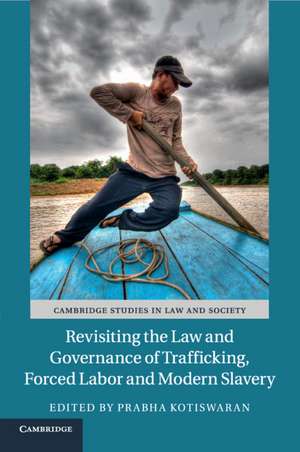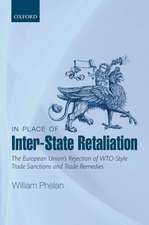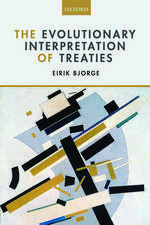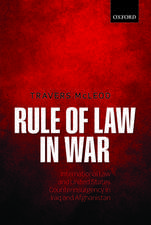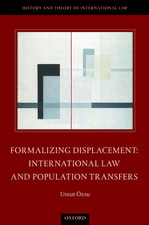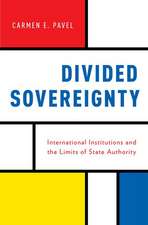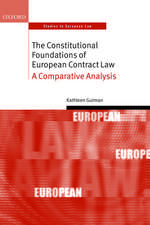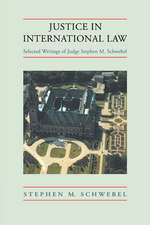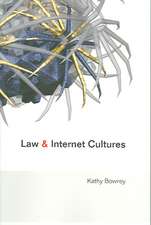Revisiting the Law and Governance of Trafficking, Forced Labor and Modern Slavery: Cambridge Studies in Law and Society
Editat de Prabha Kotiswaranen Limba Engleză Paperback – 5 dec 2018
| Toate formatele și edițiile | Preț | Express |
|---|---|---|
| Paperback (1) | 434.40 lei 6-8 săpt. | |
| Cambridge University Press – 5 dec 2018 | 434.40 lei 6-8 săpt. | |
| Hardback (1) | 1054.16 lei 6-8 săpt. | |
| Cambridge University Press – 24 mai 2017 | 1054.16 lei 6-8 săpt. |
Din seria Cambridge Studies in Law and Society
-
 Preț: 217.44 lei
Preț: 217.44 lei -
 Preț: 233.96 lei
Preț: 233.96 lei -
 Preț: 217.08 lei
Preț: 217.08 lei -
 Preț: 207.99 lei
Preț: 207.99 lei -
 Preț: 168.85 lei
Preț: 168.85 lei -
 Preț: 274.60 lei
Preț: 274.60 lei -
 Preț: 289.76 lei
Preț: 289.76 lei -
 Preț: 237.42 lei
Preț: 237.42 lei -
 Preț: 236.96 lei
Preț: 236.96 lei -
 Preț: 318.50 lei
Preț: 318.50 lei -
 Preț: 290.77 lei
Preț: 290.77 lei - 11%
 Preț: 559.13 lei
Preț: 559.13 lei -
 Preț: 185.40 lei
Preț: 185.40 lei - 9%
 Preț: 661.47 lei
Preț: 661.47 lei - 9%
 Preț: 694.92 lei
Preț: 694.92 lei -
 Preț: 176.91 lei
Preț: 176.91 lei -
 Preț: 177.28 lei
Preț: 177.28 lei -
 Preț: 169.28 lei
Preț: 169.28 lei -
 Preț: 201.39 lei
Preț: 201.39 lei - 9%
 Preț: 695.23 lei
Preț: 695.23 lei -
 Preț: 163.31 lei
Preț: 163.31 lei -
 Preț: 289.76 lei
Preț: 289.76 lei -
 Preț: 279.65 lei
Preț: 279.65 lei -
 Preț: 295.08 lei
Preț: 295.08 lei - 14%
 Preț: 723.92 lei
Preț: 723.92 lei -
 Preț: 375.68 lei
Preț: 375.68 lei -
 Preț: 327.30 lei
Preț: 327.30 lei - 14%
 Preț: 725.57 lei
Preț: 725.57 lei -
 Preț: 392.55 lei
Preț: 392.55 lei - 14%
 Preț: 839.50 lei
Preț: 839.50 lei -
 Preț: 379.07 lei
Preț: 379.07 lei -
 Preț: 429.12 lei
Preț: 429.12 lei -
 Preț: 375.68 lei
Preț: 375.68 lei - 11%
 Preț: 689.87 lei
Preț: 689.87 lei - 11%
 Preț: 694.91 lei
Preț: 694.91 lei - 14%
 Preț: 729.73 lei
Preț: 729.73 lei -
 Preț: 373.56 lei
Preț: 373.56 lei -
 Preț: 422.47 lei
Preț: 422.47 lei - 14%
 Preț: 727.72 lei
Preț: 727.72 lei -
 Preț: 308.12 lei
Preț: 308.12 lei -
 Preț: 398.54 lei
Preț: 398.54 lei - 14%
 Preț: 727.07 lei
Preț: 727.07 lei - 14%
 Preț: 726.42 lei
Preț: 726.42 lei - 14%
 Preț: 781.19 lei
Preț: 781.19 lei - 11%
 Preț: 461.43 lei
Preț: 461.43 lei
Preț: 434.40 lei
Nou
Puncte Express: 652
Preț estimativ în valută:
83.13€ • 86.30$ • 69.32£
83.13€ • 86.30$ • 69.32£
Carte tipărită la comandă
Livrare economică 25 martie-08 aprilie
Preluare comenzi: 021 569.72.76
Specificații
ISBN-13: 9781316613610
ISBN-10: 1316613615
Pagini: 606
Dimensiuni: 153 x 230 x 33 mm
Greutate: 0.8 kg
Editura: Cambridge University Press
Colecția Cambridge University Press
Seria Cambridge Studies in Law and Society
Locul publicării:Cambridge, United Kingdom
ISBN-10: 1316613615
Pagini: 606
Dimensiuni: 153 x 230 x 33 mm
Greutate: 0.8 kg
Editura: Cambridge University Press
Colecția Cambridge University Press
Seria Cambridge Studies in Law and Society
Locul publicării:Cambridge, United Kingdom
Cuprins
Introduction. From sex panic to extreme exploitation: revisiting the law of 'human trafficking' Prabha Kotiswaran; Part I. Revisiting the Text and Context of Article 3: 1. Trafficked and exploited: the urgent need for coherence in international law Michael Dottridge; 2. The international legal definition 'trafficking in persons': scope and application Anne Gallagher; 3. Contemporary debt bondage, 'self-exploitation' and the limits of the trafficking definition Janie Chuang; 4. Subjectivity of coercion: workers' experiences with trafficking in the United States Denise Brennan; Part II. Anti-Trafficking Law: A Legal Realist Critique: 5. The right to locomotion? Trafficking, slavery and the state Julia O'Connell Davidson; 6. Anti-trafficking and the new indenture Janet Halley; 7. Immigration controls and 'modern-day slavery' Chantal Thomas; 8. Representing, counting, valuing: managing definitional uncertainty in the law of trafficking Kerry Rittich; Part III. Trafficking and New Forms of Governance: 9. Counting the uncountable: constructing trafficking through measurement Sally Engle Merry; 10. Addressing HIV/AIDS at the intersection of anti-trafficking and health law and policy Aziza Ahmed; 11. Brokered subjects and sexual investability Elizabeth Bernstein; Part IV. New Directions in Anti-Trafficking Law: The Rule of the ILO: 12. Raising the bar: the adoption of new ILO standards against forced labour Beate Andrees and Amanda Aikman; 13. Trafficking and forced labour: filling in the gaps with the adoption of the supplementary ILO standards, 2014 Lee Swepston; 14. Combating labour exploitation in the global economy: the need for a differentiated approach Roger Plant; 15. Human trafficking and forced labour: should companies be liable? Zuzanna Muskat-Gorska; Part V. Rethinking Trafficking through Migration Policy: 16. The paradox of 'legality': temporary migrant worker programs and vulnerability to trafficking Hila Shamir; 17. The indentured mobility of migrant domestic workers: the case of Dubai Rhacel Salazar Parreñas and Rachel Silvey; 18. Migrants, unfree labour, and the legal construction of domestic servitude: migrant domestic workers in the UK Judy Fudge and Kendra Strauss.
Descriere
This edited volume examines contemporary global discourses on trafficking, forced labor and modern slavery from a variety of perspectives.
